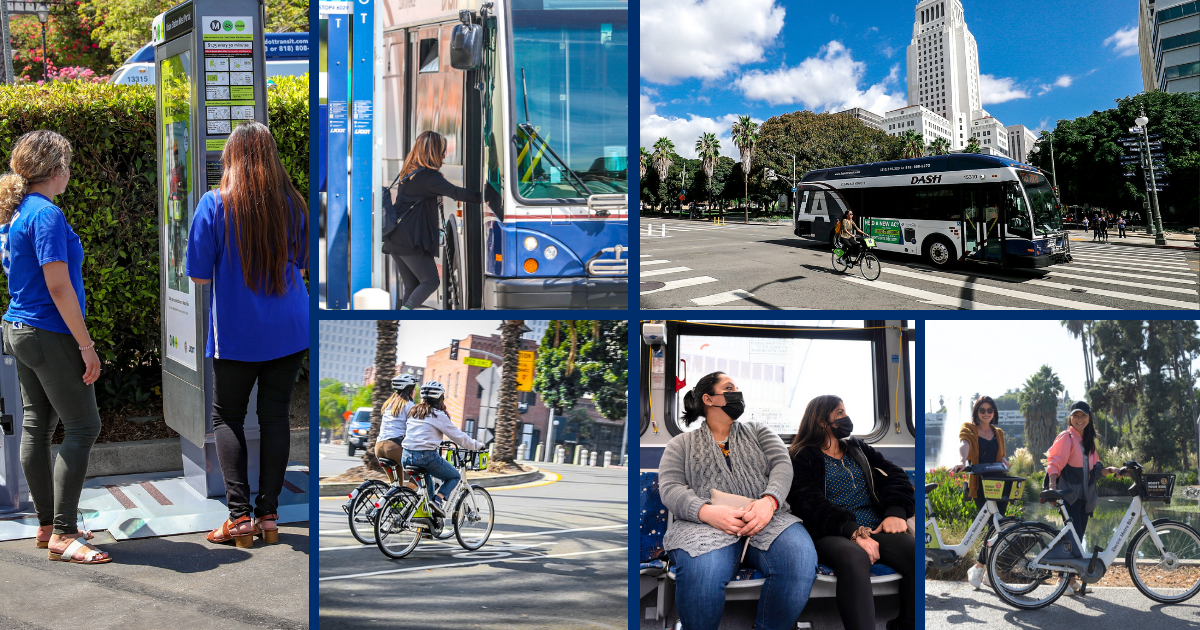
By Connie Llanos, LADOT Interim General Manager
As a woman, mother, and daughter, running the nation’s second largest transportation department, meeting my daily responsibilities is a juggle that would not be possible without transportation. I am privileged to have resources that allow me to choose the most convenient way to get to all the places I need to be on any given day – but that wasn’t always the case for me and it still isn’t for far too many women in Los Angeles. In fact, most are forced to navigate a transportation system that wasn’t designed with their needs in mind. This was why we launched our Changing Lanes work – the City’s first effort to understand and address gender-based disparities in mobility. On the heels of Women’s History Month, I am excited to share how we’re advancing this effort, as we look to ensure that all Angelenos have access to safe, affordable and dignified transportation options regardless of their age, race, and gender identity.
This work starts by acknowledging that every woman's experience is unique and their stories should inform our policies. As the first generation daughter of immigrants, I saw the sacrifices my parents had to make to ensure my brother and I made it to and from school while they worked jobs that relied on transportation – my father as a door to door salesman and my mother as a housekeeper. Later, as a working mom and full-time college student, I had to make sure I got my daughter to childcare, and myself to class, while navigating grocery runs and work shifts. The pandemic heightened awareness of these issues, as home and work lives blended. It also made it painfully clear that the planning that shaped our cities, roads, and transit systems focused on travel from the suburbs to the central city for 9-to-5 jobs, assuming that all transportation users fit one generic role - and leaving everyone else who didn’t fit the mold behind.
Today we know that the transportation needs of men and women are very different. Women tend to make longer, more complex trips than men, but the system was designed for short, direct trips. Those who identify as women are also more likely to make transportation choices based on their personal safety concerns. Using a transportation network designed without these needs in mind costs women time and money, and that price is highest for women of color.
While gender roles have changed over time, research shows that women still carry a larger proportion of domestic and unpaid care work. Women travel with children, elderly relatives, or other dependents more often. They also balance work schedules with household errands and chores and are more likely than men to travel outside of rush hour periods, when transit service is most frequent and reliable.
Mobility impacts everything from quality of life to access to jobs, education, and healthcare. Our Changing Lanes project confirmed that the transportation system in Los Angeles falls short of providing safe, convenient options for women and perpetuates inequities. Now it will also help shape the policies we implement to address these gaps.
Through a partnership with Kounkuey Design Initiative (KDI) and the Robert Wood Johnson Foundation, we are creating a comprehensive Gender Equity Action Plan for transportation in Los Angeles. This action plan, which will be completed by the end of this year, will establish a road map for LADOT and provide guidance to the agencies we collaborate with. The plan will also help us launch two pilot projects, starting this Spring, which will help us test new infrastructure and delivery models, and inform future program investments based on direct community feedback.
Planning transportation for women, girls, and gender minorities requires us to lift up the voices of those who have been left out of the conversation for too long. It forces us to ask people what they need most to get to where they need to go, safely and with dignity, and then hold ourselves accountable to deliver programs that are responsive. By prioritizing the voices of the most vulnerable we create a stronger system for our entire City.
While Women’s History Month may be in the rear view mirror, we should continue to celebrate the historic moment we’re living in Los Angeles today for female representation - in transportation and beyond. We celebrate Mayor Karen Bass as the first woman to lead the city as Mayor and the leadership and partnership of the all female Los Angeles City Council Transportation Committee, led by Chairwoman Heather Hutt. We are also grateful for the collaboration with Metro, led by CEO Stephanie Wiggins, and with the support of an all female County Board of Supervisors. I’m honored to work for and with such incredible women. Together they not only make herstory, but they bring their unique experiences and perspectives to the table which in and of itself challenges the status quo. I look forward to adding my voice to this chorus as we work to build a transportation system that meets the needs of all Angelenos.

